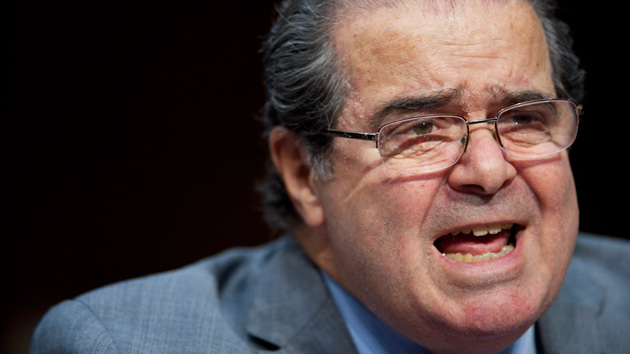When someone who has hurt you is no longer in the position to do so again, it is natural to be happy. Requiring decorum of his victims is adding insult to the injuries that he has inflicted.
Everybody in our house knew the exact minute when I read that Supreme Court Justice Antonin Scalia had died. I whooped and hollered like a monkey wasted on Red Bull and vodka.
However, when I took to social media, I toned down my response considerably. As a quasi-public figure, I have empathy for what his family might feel if we all ran out and danced in the digital streets. But mostly, I didn’t want people to think I am an asshole. In our society, it is considered disrespectful and downright rude to dance on another person’s grave.
That being said, I do not believe it behooves anyone else to refrain from celebrating Scalia’s death. In fact, I think it might be healthy for some people to express how they feel and even healthier for us to listen. Here are five reasons why it’s OK to have whatever reaction you want to Scalia’s death:
1. People are celebrating the death of Antonin Scalia, the Supreme Court Justice, not the man. Most of us do not know the Scalia who was a husband, father, and colleague. Our only relationship with him was that of a person subject to the decisions of a powerful political figure. Of course we have sympathy for his family, friends, and colleagues who will miss him. But it is about as much sympathy as we would have for the friends and family of any other person we have never met and don’t have even a tangential relationship to.
2. Antonin Scalia, the Supreme Court Justice, has a long and painful history of saying and doing things that are an affront to the dignity of people who do not have a white penis solely dedicated to procreation with a religiously-sanctioned wife. He was one of this nation’s biggest bigots, and what he said and did caused untold pain.
When I asked my Facebook friends if any of them felt that Scalia had personally impacted their lives, my friend Justin wrote:
“Scalia argued for an interpretation of the Constitution that excluded me from the society he was sworn to protect. Because of his position, the harm done by one man’s bigotry went far beyond mere ‘animus.’ I’m grateful to the Supreme Court justices who voted to strike down sodomy laws with 1993’s Lawrence v. Texas. The difference that decision made to me was secular salvation. I, a queer American, am a part of the communion of souls that is America. I am not one of her rejected children.”
When someone who has hurt you is no longer in the position to do so again, it is natural to be happy. Requiring decorum of his victims is adding insult to the injuries that he has inflicted.
This is actually a pretty normal reaction. The same thing happened in 2013 when Margaret Thatcher died. People in Britain celebrated, throwing what was dubbed “death parties.” People who had been victimized by Thatcher policies were glad to know that the person who had caused them so much pain was gone.
3. Since Supreme Court Justices serve for life, Antonin Scalia’s death will have a very real impact on the lives of many people.
At the risk of being overly blunt, the only reason that Scalia’s ruinous run on the bench is over is that he is dead. Many people are not celebrating the fact that he is dead so much as they are celebrating the fact that he will no longer be able to ruin the lives of people with his rulings.
4. The death of Scalia is the end of an era, one in which the basic human rights of individuals were being systematically reversed. He was not just any Supreme Court judge. The court was pretty much evenly split before Scalia’s death. Now the balance will tip away from Conservativism and its attendant assaults on human rights and dignity.
What is more, Scalia was not shy in his bigotry. He said truly reprehensible things about homosexuals and black people in his tenure as a Justice whether from the bench or in interviews. And that legitimized the continuation of hate speech nationally and prejudicial rulings from the court. At least one other justice is said to have adopted whatever position Scalia took.
5. It is high time we stop telling oppressed people what feelings they can and cannot express. This is what we mean when we say that “tone policing” has to stop. To say that people who have been oppressed by Scalia cannot celebrate his death is both wrong and unjust.
It says that their experience of oppression is less important than politeness. People who have wielded as much power as Scalia give up their right to be mourned universally. Their decisions have left their marks on our lives.
No one who has been oppressed or hurt by a public figure owes that person respect just because he or she has died. To paraphrase Anne Lamott: If they wanted you to remember them warmly or at least civilly, they should have behaved better.
Lynn Beisner writes about family, social justice issues, and the craziness of daily life. Her work can be found on Role Reboot, Alternet, and on her blog: Two Parts Smart-Ass; One Part Wisdom. You can find her on Facebook and Twitter.
Other Links:

